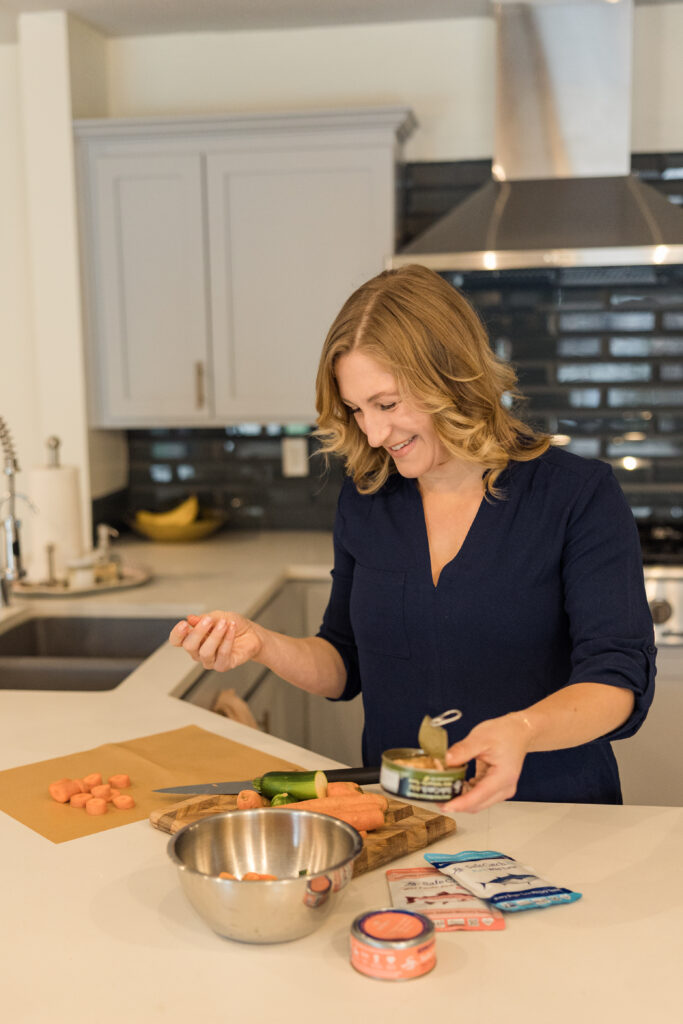As a registered dietitian nutritionist and certified diabetes educator, I see first-hand how big of an impact diabetes (both type 1 and type 2) can have on someone’s life. Not only the disease process itself, but the side effects of medications can be challenging to deal with day in and day out. Nausea, abdominal pain, loss of appetite, liver inflammation, and skin rashes…just to name a few. On the bright side, there are some things you can do to help manage your diabetes. And in some cases, people are able to reduce or come off of their medications entirely. It really depends on their diagnosis, but they can work to resolve their diabetes so it’s no longer something they battle.
What is diabetes?
Diabetes is a common condition that arises when your body cannot produce enough insulin to break down blood sugars, potentially resulting in severe health conditions.
There are two different types of diabetes: type 1 and 2. Type 2 is by far the most common, with 90-95% of Americans being diagnosed with the condition.
Although there is currently no cure, those with type 2 diabetes can manage their condition by making some lifestyle changes. This type of diabetes is characterized by a sedentary lifestyle and obesity, so making healthy changes can go a long way. In type 2 diabetes, one of two things occurs: the pancreas does not produce enough insulin to keep up with the demands that are put on the body. The other issue that our cells become desensitized to insulin. This leads to insulin not working as it should to help lower blood sugar.
Listed below are four ways that you can help to manage your type 2 diabetes, and even potentially stop using medications for it. Some simple diet and lifestyle changes can have a major impact on the progression, or regression, of your diabetes.
How to Manage Your Diabetes
Eat a healthy and balanced diet

Your diet has an impact on your weight, so make sure to eat regular balanced meals that are low in calories and high in nutrients. This could mean meals with lean meats, plenty of fiber rich vegetables, and healthy fats.
It’s also important to be aware of carbohydrate intake if you’re living with type 2 diabetes. Carbohydrates are broken down into glucose, and consuming excessive amounts can cause blood sugar levels to spike. Now, this doesn’t mean you can never eat a carb again. It just means the sources of your carbs, how many you eat in a day, and – believe it or not – the order you consume them in your meal, matters.
Eating your carbs last in your meal ensures your body has the vegetables, protein and fat to help keep a more stable blood sugar. It also helps to decrease the “spike”. I call this method VPFC, and it’s the way I eat every single meal! It keeps me feeling my best, and I avoid the post-blood sugar spike hangover.
Excess carbohydrate intake can also contribute to insulin resistance, Aim to keep your focus on high-protein intake, limiting refined carbs, and incorporating healthy fats into each meal. This will help maintain a steady blood sugar and ultimately manage your diabetes.,
Exercise Regularly
Exercising and daily movement can have many health benefits in general, such as improving cardiovascular health, increasing your energy, and uplifting your mood. It can also help those who have been diagnosed with type 2 diabetes. Getting your body moving helps it to use insulin more efficiently, which can lead to improved blood sugar levels. It also promotes weight loss. One tip I love to share that not only helps to lower blood sugar levels, but encourages movement, is a 10-minute walk before or after a meal. Moderate exercise or movement around mealtime can lower your blood sugar levels. This is because your muscles are using up the carbohydrates that you likely ingested. Talk about a win-win situation!
If you’re someone who usually doesn’t exercise, it’s important to start small to avoid feeling discouraged. Try to get outside for a short walk with a friend or your spouse a few days a week. Building an exercise routine takes time but is achievable. Alternatively, cycling, swimming or yoga can be just as effective. You can even try different exercises through ClassPass, and easily switch up your workout routine. If it’s fun, you’re more likely to stick to it!
Work with a Dietitian
 Taking matters into your own hands and making the lifestyle changes I mentioned above can really have a major impact on your overall health. However, ultimately, working with a dietitian who is certified in diabetes education (like me!) is going to make the biggest impact! You can get the knowledge and tools you need to feel empowered in your health journey. The goal isn’t to stay working with a practitioner forever; specifically in my practice I give my patients the tools, confidence and foundation to not need me forever! My goal is to provide in-depth education on your diabetes rather than the 15 minutes conventional medicine gives you. Having that knowledge helps you to better manage (or eliminate) your diabetes.
Taking matters into your own hands and making the lifestyle changes I mentioned above can really have a major impact on your overall health. However, ultimately, working with a dietitian who is certified in diabetes education (like me!) is going to make the biggest impact! You can get the knowledge and tools you need to feel empowered in your health journey. The goal isn’t to stay working with a practitioner forever; specifically in my practice I give my patients the tools, confidence and foundation to not need me forever! My goal is to provide in-depth education on your diabetes rather than the 15 minutes conventional medicine gives you. Having that knowledge helps you to better manage (or eliminate) your diabetes.
Manage your weight
Obesity is one of the main risk factors for type 2 diabetes. Excess body fat makes it harder for insulin to work properly, leading to increased blood sugar levels. Losing some of this excess weight where needed can provide a substantial improvement to your body’s sensitivity to insulin. The more sensitive our body is to insulin, the better it responds when insulin is secreted. This means that our blood sugar lowers as it should when a smaller amount of insulin is secreted. Poor insulin sensitivity is hard on our bodies and can lead to it not responding to insulin like it should.
So, if you’re someone who lies within the obese range, consider some of these lifestyle changes to help loose some body fat. A weight loss of even just 5-10% of your body weight can have significant health benefits. There are also many non-weight reasons to manage your weight. Increased energy, better sleep – and if you’re someone that struggles with joint aches – a reduction in that, too, can all improve.
Type 2 diabetes can be a challenging condition to manage. Making the right lifestyle changes makes it possible to get off of your medications, or even resolve the condition completely. Following my tips listed above can help you to get started on your journey, but it may feel overwhelming. If you’re feeling overwhelmed or want extra support to meet your goals, work with me! I will help you to develop a personalized plan that factors in your current health, lifestyle and goals. With the right support and education, you can take back control of your health and start the journey to put your diabetes into remission.



